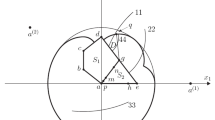Abstract
We consider a two-person nonantagonistic positional differential game (NPDG) whose dynamics is described by an ordinary nonlinear vector differential equation. Constraints on values of players’ controls are geometric. Final time of the game is fixed. Payoff functionals of both players are terminal. The formalization of positional strategies in an NPDG is based on the formalization and results of the general theory of antagonistic positional differential games (APDGs) (see monographs by N.N. Krasovskii and A.I. Subbotin [3, 4]). Additionally, in the present paper we assume that each player, together with the usual, normal (nor), type of behavior aimed at maximizing his own functional, can use other behavior types introduced in [2, 5]. In particular, these may be altruistic (alt), aggressive (agg), and paradoxical (par) types. It is assumed that in the course of the game players can switch their behavior from one type to another. Using the possibility of such switches in a repeated bimatrix 2 × 2 game in [5, 6] allowed to obtain new solutions of this game. In the present paper, extension of this approach to NPDGs leads to a new formulation of the problem. In particular, of interest is the question of how players’ outcomes at Nash solutions are transformed. An urgent problem is minimizing the time of “abnormal” behavior while achieving a good result. The paper proposes a formalization of an NPDG with behavior types (NPDGwBT). It is assumed that in an NPDGwBT each player, simultaneously with choosing a positional strategy, chooses also his own indicator function defined on the whole game horizon and taking values in the set {normal, altruistic, aggressive, paradoxical}. The indicator function of a player shows the dynamics of changes in the behavior type demonstrated by the player. Thus, in this NPDGwBT each player controls the choice of a pair {positional strategy, indicator function}. We define the notion of a BT-solution of such a game. It is expected that using behavior types in the NPDGwBT which differ from the normal one (so-called abnormal types) in some cases may lead to more favorable outcomes for the players than in the NPDG. We consider two examples of an NPDGwBT with simple dynamics in the plane in each of which one player keeps to altruistic behavior type over some time period. It is shown that in the first example payoffs of both players increase on a BT-solution as compared to the game with the normal behavior type, and in the second example, the sum of players’ payoffs is increased.
Similar content being viewed by others
References
Kleimenov, A.F., Neantagonisticheskie pozitsionnye differentsial’nye igry (Non-Zero-Sum Positional Differential Games), Yekaterinburg: Nauka, 1993.
Kleimenov, A.F., Solutions in a Nonantagonistic Positional Differential Game, J. Appl. Math. Mech., 1997, vol. 61, no. 5, pp. 717–723.
Krasovskii, N.N., Upravlenie dinamicheskoi sistemoi. Zadacha o minimume garantirovannogo resul’tata (Control of a Dynamical System. Minimum Guaranteed Result), Moscow: Nauka, 1985.
Krasovskii, N.N. and Subbotin, A.I., Pozitsionnye differentsial’nye igry (Positional Differential Games), Moscow: Nauka, 1974.
Kleimenov, A.F. and Kryazhimskii, A.V., Normal Behavior, Altruism and Aggression in Cooperative Game Dynamics, Interim Report IR-98-076, Laxenburg: IIASA, 1998.
Kleimenov, A.F., An Approach to Building Dynamics for Repeated Bimatrix 2 × 2 Games Involving Various Behavior Types, in Dynamic and Control, Leitman, G., Ed., London: Gordon and Breach, 1998, pp. 195–204.
Author information
Authors and Affiliations
Corresponding author
Additional information
Original Russian Text © A.F. Kleimenov, 2015, published in Matematicheskaya Teoriya Igr i Ee Prilozheniya, 2015, No. 4, pp. 40–55.
Rights and permissions
About this article
Cite this article
Kleimenov, A.F. Altruistic behavior in a nonantagonistic positional differential game. Autom Remote Control 78, 762–769 (2017). https://doi.org/10.1134/S0005117917040178
Received:
Published:
Issue Date:
DOI: https://doi.org/10.1134/S0005117917040178




